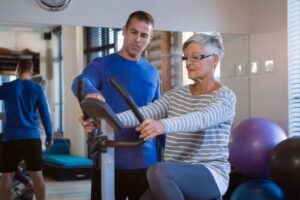Accredited Exercise Physiologists are university-qualified allied health professionals who prescribe clinical exercise interventions to treat or manage medical conditions and injuries. They work in partnership with Physiotherapists to provide holistic healthcare and self-management strategies.
This includes health and fitness education, advice, support, and lifestyle modification focusing on sustainable behavioural change. For professional exercise physiology services for seniors, check out exercise physiology for seniors Adelaide now.
Exercise prescription
 Exercise prescription is a vital skill for the modern health care practitioner. It is an effective evidence-based treatment for osteoarthritis, back pain, tendinopathy, depression, diabetes, and cardiovascular disease. While it is not traditionally part of medical school curricula or many advanced post-graduate training programs, exercise prescription is becoming an essential skill for primary care practitioners.
Exercise prescription is a vital skill for the modern health care practitioner. It is an effective evidence-based treatment for osteoarthritis, back pain, tendinopathy, depression, diabetes, and cardiovascular disease. While it is not traditionally part of medical school curricula or many advanced post-graduate training programs, exercise prescription is becoming an essential skill for primary care practitioners.
A qualified exercise physiologist can provide an individualised and tailored exercise program to help improve your overall health. They will commence by reviewing your medical history, physical limitations, and fitness goals. Then, they will design a comprehensive, functional reassessment and prescribe a specific action plan. This may include regular reviews, in-clinic and home-based exercise sessions, or one strength-based gym program tailored to your needs.
This may also include dietary and sleep advice and the use of specialised equipment. Exercise physiologists also strongly focus on preventing, educating and managing conditions and injuries. Some even offer Medicare Australia-referred allied health services such as acupuncture and dry needling.
Accredited Exercise Physiologists are highly trained and fully accredited allied health professionals specialising in rehabilitating injuries and chronic diseases. They have four years of university training and are regulated by their professional body, Exercise and Sports Science Australia. They have the skills and knowledge to plan, develop, deliver and supervise various preventative and therapeutic exercise interventions.
The COVID-19 pandemic triggered a shift in healthcare delivery to telehealth, including exercise physiology services. However, this allied health profession has several challenges, including patient access, reimbursement through Medicare items and funding, and patient safety.
Fortunately, several universities and professional organisations now offer a variety of graduate-level exercise physiology courses and certifications. It is essential to carefully research these educational options and choose ones affiliated with reputable institutions recognised by industry leaders. In addition, online courses and programs are increasingly popular and offer a flexible learning environment. These options are often associated with lower costs and fewer restrictions than traditional programs.
Musculoskeletal rehabilitation
Musculoskeletal injury is one of the leading causes of pain and disability worldwide. It can affect a wide range of structures in the body, including muscle, bone, and ligaments. In addition to pain, it can also result in impaired mobility and reduced quality of life. Fortunately, musculoskeletal rehabilitation can help you return to normal activities after an injury.
Accredited Exercise Physiologists can prescribe safe and effective exercise programs for people with various health conditions or injuries. During an initial consultation, your exercise physiologist will ask questions about your goals and current health status to determine what exercise program would suit you most. They will also perform physical assessments to check your health and fitness levels.
This study examined the impact of the COVID-19 pandemic on the reach, efficacy and adoption of telehealth delivery for exercise physiology services in Australia. The research found that during the COVID-19 pandemic, most Australian-accredited exercise physiology clinicians offered telehealth-based services to their clients (adoption), with most clinicians offering synchronous telehealth delivery for the same client group (implementation). This trend was consistent across clinic and regional locations and varied by referral pathway.
The results of the current study suggest that telehealth-based musculoskeletal rehabilitation for exercise physiology can be implemented successfully in Australia. However, the need to address barriers to implementing telehealth delivery remains. These barriers include physical/cognitive incapacity, perceived safety concerns, and access to reliable platforms.
Understanding and addressing these barriers is essential to maximise the potential for telehealth musculoskeletal rehabilitation. This will help to improve client outcomes and the sustainability of telehealth delivery for this service. This will require collaboration between the referring practitioner, exercise physiologist, and client. This will be particularly important for individuals with complex needs. This includes those with long-term chronic health conditions, such as arthritis. These individuals may require a long-term approach to their care and regular review by the treating doctor. This will ensure their condition is managed effectively, enabling them to live longer and independently.
Diabetes
If you are living with diabetes, a personal exercise prescription from an Accredited Exercise Physiologist can help manage your condition. Exercise physiology is a healthcare profession specialising in clinical exercise interventions for people with acute, sub-acute or chronic medical conditions and injuries. These professionals work in various healthcare settings, including hospitals, rehabilitation centres, fitness centres and sports clinics. They collaborate with other healthcare professionals, such as physicians and physiotherapists, to deliver comprehensive patient care. For professional exercise physiology services for seniors, check out exercise physiology for seniors Adelaide now.
